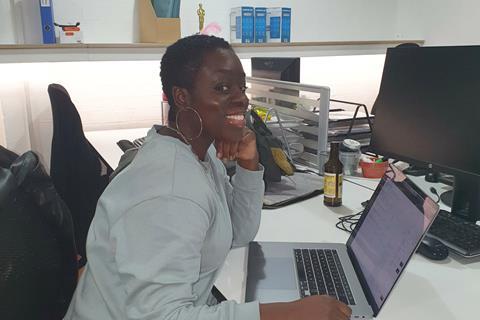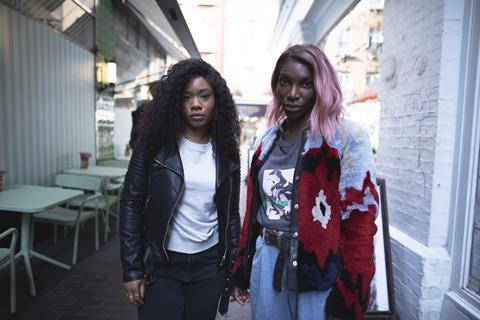The founder of The British Blacklist tells Screen why the time is right for black creative talent to become a force within the UK industry

Writer and broadcaster Akua Gyamfi founded The British Blacklist (TBB) in 2012, as an online portal to celebrate and promote the work of British African and Caribbean creatives working across screen, stage, sound and literature through features, reviews and events. Gyamfi has also worked as an entertainment writer, script consultant and producer, including at the BBC Writersroom, where she collaborated with director Mark 1 on the anti-knife and gun crime short film After Effects. Gyamfi says she has used the forced pauses of the past year to really focus on TBB, and to continue to advocate for black British voices in the entertainment industry.
What has been your most memorable moment of 2020?
At the beginning I was overwhelmed with the expectations of what I needed to do. We’ve been looking at how we best deliver TBB content on the editorial side, and how we deliver the database [of black British creative talent] to the best of the industry’s needs. The highlight was having the time to pause, reflect, take stock, evaluate and refresh. In amongst that we had some great conversations. One of them, with Passion Pictures, has been really fruitful and a great partnership has been born, as they will be supporting TBB with the development of our talent database.
The Black Lives Matter movement has also defined this year. How do you see it impacting the industry and beyond?
We have been talking for many years about institutional racism. But now we have all had to confront it. The people who make up the industry, like everyone else, had had to put into perspective what is important to them. The moment when George Floyd was murdered [by a Minneapolis police officer in a violent arrest that was captured on video], we were forced to recognise there is a problem with the world when it comes to diversity. That there’s been one mainstream entity, white folk, who have maintained this facade that everything has to go through their perspective.
With the success of I May Destroy You, The Last Tree, Nine Nights, Blue Story, we have also seen the UK has a black creative industry that’s bursting at the seams to release itself. It will no longer be told it’s not good enough, or their stories don’t carry weight. With the industry being forced to reckon with all these things, there’s excitement and positivity… and a sigh of relief.
Do you think this change will last into 2021?
People like us have been banging this drum for many years. There’s a slight cynicism that when everything returns to whatever normal is, these voices will be drowned out again. I’m old enough to remember what it was like in the 1980s, maybe the early 1990s, when there was a black creative renaissance. There were black people on screen and behind the scenes, at least on television. And that didn’t last. There is an inherent fear of black power, creative and economic. We just get told repeatedly that anything to do with white people is great, and anything to do with any other group is not.

But I hope that won’t happen this time, with the protests and the pushbacks. Look at [I May Destroy You creator] Michaela Coel, turning down a Netflix deal because she wanted autonomy and control of her idea. That’s hugely influential. It’s going to be very hard for someone to now stand in the face of black creativity and say, ‘Your story won’t sell.’ And black people are gaining confidence to stand their ground without feeling like they’re going to be labelled as ‘difficult’.
This is about change to the emotional mindset. It will be difficult to brainwash us all a second time around.
Audience habits have necessarily changed in 2020; is that having an impact on the kinds of stories we are seeing?
I do think that the industry has been changed forever. I think that ways of accessing content have been made far more comfortable for people at home. But whenever lockdown lifts, and we are COVID-19 free or at least COVID controlled, people will want to go to the cinema, and to festivals. But the streamers have shown that smaller independent films do work, and people do want more diverse stories.
Our music industry, too, is thriving on the back of British grime and hip hop artists. There’s a desire for our content. So perhaps producers and distributors don’t need to be so risk-averse, because the audience demand is there.
What excites you about the future of the industry?
Now people have had this time to pause and reflect, perhaps we can rethink the way things are done. I personally have had to get more business-minded and take emotions out of it. Let’s have quality standards that are faceless, genderless. Is this person good enough to hire, based only on the work they have done? Great, let’s get cracking. They are qualified but I can’t hire them because they’re black, or they have a funny name? That won’t work anymore.
I’m really excited that people are no longer accepting industry standard answers. And for what this moment of newfound freedom means for black creators. Black people have always been so creative, but we have always been on the back foot because of the structure of the system, and systemic racism. I’m really excited about what black people who have the finances and freedom to tell their stories are going to do.
Our Perspectives on 2020 series sees key figures from across the international industry landscape share their experiences during the pandemic year and their thoughts on the future. See below for more interviews in the series:






![The Brightest SunScreen[Courtesy HKIFF]](https://d1nslcd7m2225b.cloudfront.net/Pictures/274x183/3/5/0/1448350_thebrightestsunscreencourtesyhkiff_312678.jpg)


















No comments yet